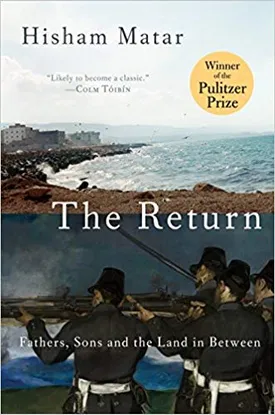The Return: Fathers, Sons and the Land in Between by Hisham Matar
When acclaimed novelist Hisham Matar was just 19, his father was kidnapped in Cairo and disappeared forever. Matar’s new book, The Return: Fathers, Sons and the Land in Between, is a powerful exploration of the toll taken by political cruelty and brazen resolve in this true-life father-and-son story of courage, endurance and hope.
In 1990, after 18 years in exile, Matar returns to Tripoli, at a time when Libya was ruled with an iron fist by its dictator, Muammar Gaddafi. Determined to learn the truth about his father’s fate, Matar embarks on a journey of personal discovery. As he uncovers the stories of those who experienced the pain and anguish of Gaddafi’s regime, Matar finally finds his father’s last judgment day and answers the question of his fate.
Matar weaves personal anecdotes, vivid family details and vivid accounts of his own experience of a totalitarian state with a wealth of historical detail to create an intimate yet appalling portrait of a place and its people. He takes readers on a journey of rebellion, torture and courage, while highlighting within the horrific violence the courage and grace of the survivors. He illuminates the plight of the Libyans during one of the most repressive regimes of the modern era and gives us access to rarely seen aspects of the culture, in particular, what it is like for ordinary Libyans trying to survive under an oppressive government.
The book is structured around a number of trips Matar takes from his home in London to Tripoli. Through these journeys, we see how Matar’s understanding of the country he left at a young age shifts from a childhood fantasy of an idyllic Libya to a chilling portrait of modern Libya. As his journey continues and he travels from one country to another, his understandings and realizations about his father’s disappearance, the political landscape and the stories of those who lived and died under the regime of Gaddafi all become clearer.
At the heart of The Return, Matar speaks of the land of his birth and its people with great affection. He pleads for the recognition of their plight, and reflects on the courage and resilience of Libyans who refused to give up in their fight against Gaddafi’s tyranny. He shows us the invisible victims of Gaddafi’s regime, including children, who were left behind in Libya and were unable to leave and seek refuge elsewhere in the world.
In his exploration of the power of resilience in The Return, Matar also magnifies the devastating effects of exile and captivity. His hope that one day his father will be returned alive, and the unending grief and sorrow at his disappearance, become a reflection of the impact of dictatorship upon those who live it. With great sensitivity and insight, The Return not only illuminates a past of tragedy, but it celebrates the courage of the Libyan people who must face the future.
The Return by Hisham Matar provides an intimate and unforgettable exploration of the human cost of war, violence and oppressive governments. Through his personal story of loss and hope, we are reminded of the power and resilience of the human spirit in the face of despair and we are left to contemplate the enduring courage in the pursuit of peace.

